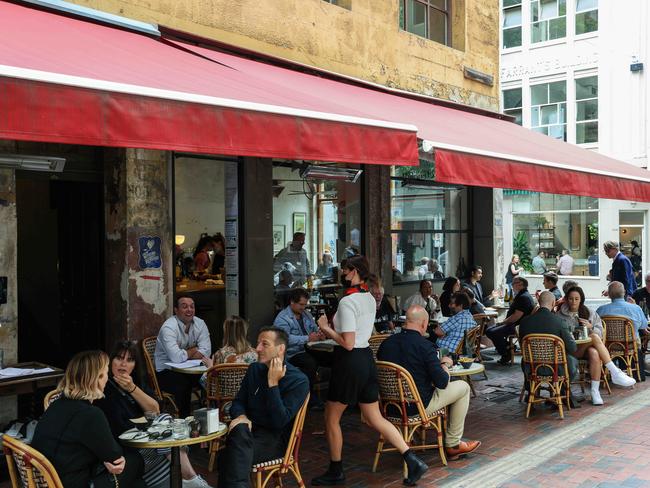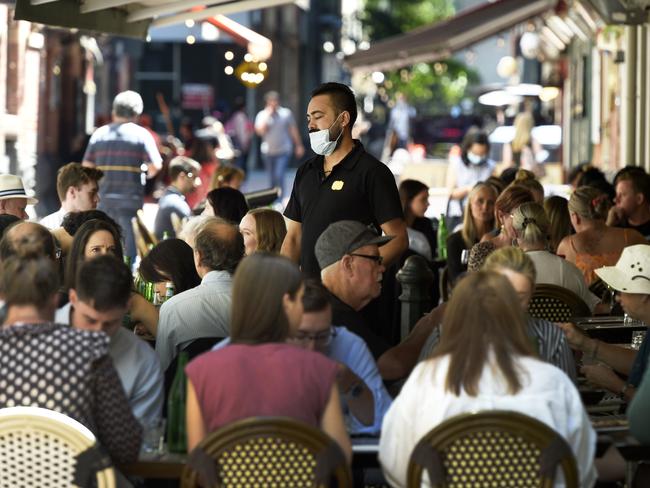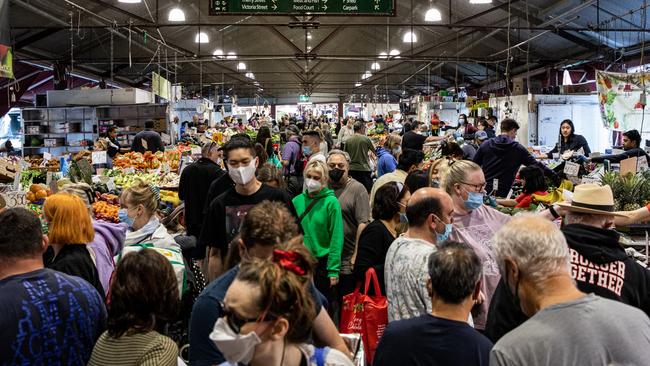Victoria to relax indoor mask rule, work from home recommendation
There has been confusion over why masks will be scrapped in most indoor settings but not for students in year 3 or above at primary school. Premier Daniel Andrews has explained the move.
Coronavirus
Don't miss out on the headlines from Coronavirus. Followed categories will be added to My News.
This coronavirus article is unlocked and free to read in the interest of community health and safety. Tap here for full digital access to trusted news from the Herald Sun and Leader for just $1 for the first 28 days.
Premier Daniel Andrews says the key decision to keep masks on students in grade 3 to 6 is because vaccination rates in that cohort are still too low.
Masks will be scrapped in most indoor settings and the work-from-home recommendation will be lifted from 11.59pm this Friday.
Federal Health Minister Greg Hunt welcomed the mask changes but said there was “more to be done” to “allow people to return to their lives and the normal freedoms as quickly and safely as possible”.
He said it was up to the state government to explain why primary school students in grades 3 to 6 still needed to wear masks.
“I know for some parents it will be hard, and for kids,” Mr Hunt said.
Health Minister Martin Foley made the announcement on Tuesday morning, citing that a decline in hospitalisation rates and an uptick in third dose vaccination rates allowed the government to make the “sensible changes”.
Masks are still recommended for other workers serving or facing members of the public, such as if you are at reception, meeting guests or serving customers.
Melbourne restaurateur Chris Lucas slammed the move to keep hospitality workers masked.
“Our brave staff have worn facemasks throughout one the hottest summers on record and were very much looking forward to being free of this useless practice,” he said.
“It’s beyond disgraceful that the Victorian government is dragging on with their Covid hysteria at a time when we should be celebrating and getting back to a normal life.
“To single out hospitality says more about the incompetence and pigheadedness’s of a government that has lost its way and simply doesn’t care about workers.”

Lord Mayor Sally Capp said the scale-back of restrictions would significantly help to recharge the city.
“The shackles are off and people can now feel confident to come back into the city for work,” Cr Capp said.
“Good coffees, long lunches, the theatre after work, pre-drinks before footy at the ’G – the Melbourne we all love is here waiting for you.
“We’ve endured two years of ordinary. Two years of staring at the same four walls. It’s time to move, to interact with new faces and to feel that sense of discovery again.
“We know the rhythm of the city has changed; we know we need to earn your commute. We are doing everything we can to entice you back because we believe in this city and its possibilities.”
Victorian Chamber of Commerce and Industry chief executive Paul Guerra said the announcement was the “signal we have been waiting for”.
“There are no impediments left for workers to return to offices and we can now get every part of Victoria up and running,” Mr Guerra said.
“It’s what CBD businesses who rely on the office worker trade have been desperately seeking and they now have certainty to plan for the return of their usual clientele from next week.
“It is now time for our leaders to have the conversation with employees and get this happening, in a way that works for their organisation.”

Australian Retailers Association CEO Paul Zahra said the removal of masks in most indoor settings is “practical”.
“Most employers and their staff have embraced working from home arrangements, and it’s a trend that’s here to stay. However, it’s equally important that we get teams back face-to-face to improve mental health outcomes, collaboration and relationship building,” Mr Zahra said.
Tim Piper, the Victorian Head of the peak employer association Ai Group, said the decision was a “boost for the community and the economy”.
“Employers know there will be a reluctance from some to return to work – for many reasons – and no doubt the changes to working arrangements will occur over the next few weeks. But this announcement is a signal that it is time to return to greater normality and we should get used to it,” he said.
Following a further assessment of hospitalisation rates and workforce pressures, the remaining restrictions on elective surgery will also lift on Monday, February 28.
It comes as Victoria on Tuesday announced 6786 new Covid cases and 14 deaths.
Hospital admissions dipped to 345, with 48 patients receiving intensive care, including eight on a ventilator.
Mr Foley credited the work of Victorians as having allowed the changes.
“Victorians have done such a great job getting vaccinated, so we’re able to take safe steps to get more people to return to the office,” he said.
“We’re balancing the need to support our health system with the benefits of easing restrictions in a careful and sensible way.”
Mr Foley on Tuesday also declared a number of temporary exceptions and deadline extensions for workers.
The third dose deadline for workers in education facilities who were fully vaccinated on or before October 25 will be extended by a month, provided that workers have a booking within that time.
It means all education workers have until March 25 to become “up to date” as per ATAGI advice.
Fully vaccinated workers who aren’t yet eligible for a third dose will have a deadline of three months and two weeks from when they had their second dose.

Workers who are recent international arrivals will have a new third dose deadline of four weeks from the date of their arrival, provided they have evidence of a future booking.
Premier Daniel Andrews also confirmed he had been speaking with NSW Premier Dominic Perrottet and the national cabinet about revising isolation requirements for household contacts.
He said ahead of winter, it was crucial that the government landed on ensuring furloughing impacts were minimised.
“I don’t know whether we’ll get a national decision on that,” he said.
Mr Hunt said he also strongly supported work being led by Victoria and New South Wales to allow asymptomatic household contacts of Covid cases to avoid a mandatory seven-day period in isolation.
Relaxing this rule had worked well so far for workers in frontline roles, Mr Hunt said, and the national medical expert panel was considering if it could be implemented more broadly.
“If the medical advice indicates that it’s safe then we’ll do it,” he said.
“These are emergency measures, these are not permanent conditions.”
More Coverage
Read related topics:Daniel Andrews




